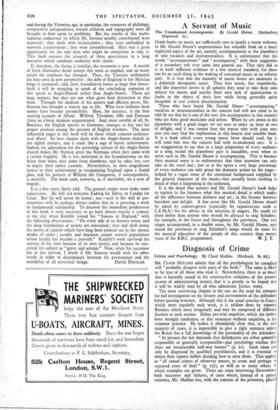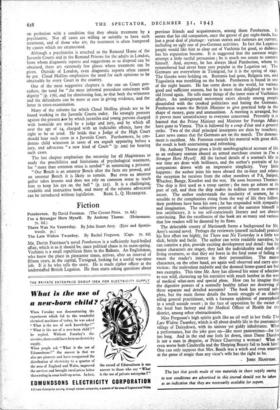Diagnosis of Crime
Crime and Psychology. By Claud Mullins. (Methuen. 8s. 6d.)
Ma. ('LAUD MULLINS admits that all the psychologists he consulted will " probably disagree with parts of the book." The same is likely to be true of all those who read it. Neiertheless, there is so-much that is basically sound in his constructive criticisms of the present system of administering justice, that it is greatly to • be hoped that it will be widely read by all Who administer Justice today.
The most convincing chapter is the one on the need for remands for full investigation on the history and environment of the defendant before passing sentence. Although this is the usual practice in Courts which meet regularly each week, it is seldom done by country: Benches which meet irregularly and may be composed of different Justices at each session. Either pre-trial enquiries, which the author most strongly condemns, or else sentences without enquiries, is the common practice. He makes it abundantly clear that, in the vast majority of cases, it is impossible to give a right sentence unless the Bench has a full knowledge of the personality of the defendant; " At present the law demands that delinquents are either generally, responsible or generally irresponsible—Inn psychology teaches that' there are innumerable half-way houses " (p. 2!). Such cases can only be diagnosed by qualified psychiatrists, and it is essential to obtain their reports before deciding how' ow to treat them.- This applies to " all sexual crimes of whatever nature, to arson and perhaps to repeated cases of theft" (p. 157), as Well as to many others of which examples are given. There are some interesting 'illustrations, both successes and failures, of cases where, instead of a prison sentence, Mr. Mullins has, with the consent of the prisoners, placed
on probation with a condition that they obtain treatment by a psychiatrist. Not all cases are willing or suitable to have such treatment, and of those who are, the treatment is often hampered by causes which are enumerated.
Although a psychiatrist is attached to the Remand Home of the Juvenile Courts and in the Remand Prisons for the adults in London, from whom diagnostic reports and suggestions as to disposal can be obtained, there are extremely few places where treatment can be given. Outside of London, even diagnostic reports often cannot be got. Claud Mullins emphasises the need for such opinions to be obtainable by every Court in the country.
One of the most suggestive chapters is the one on Court pro- cedure, the need for " the most informal procedure consistent with dignity " (p. 176), and for eliminating fear, so that both the witnesses and the defendants can be more at ease in giving evidence, and the latter in cross-examination.
Many of the reforms for which Claud Mullins pleads are to be found working in the Juvenile. Courts today. He strongly protests against the present law by which juveniles and young persons charged with homicide are tried by a judge and jury, and by which all over the age of 14, charged with an indictable offence, have the right to be so tried. He holds that a Judge of the High Court should hear such cases in a Juvenile Court. Furthermore, he con- demns child witnesses in cases of sex askault appearing before a jury, and advocates " a new kind of Court " (p. 200) for hearing such cases.
The last chapter emphasises the necessity for all Magistrates to study the possibilities and limitations of psychological treatment, for " more than common sense is needed" in sentencing a prisoner.
" Our Bench is an amateur Bench after the facts are proved, and an amateur Bench it is likely to remain. But even an amateur golfer takes lessons and does not rely on common sense to teach him to keep his eye on the ball " (p. 225). It is a challenging, readable and instructive book, and many of the reforms advocated































 Previous page
Previous page